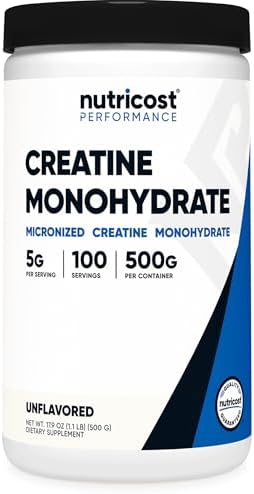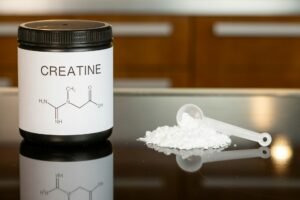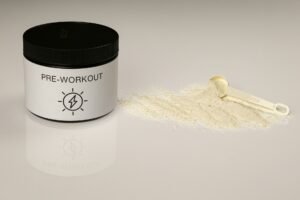When it comes to enhancing your workouts and overall fitness, L carnitine vs creatine supplements have earned a spot in the spotlight. While both are amino acids that influence energy production, they serve different purposes and can complement your training in unique ways. Understanding their benefits, how they work, and which one aligns with your goals can help you make an informed choice—and get the most out of your fitness journey.
Table of Contents
Understanding L-Carnitine: The Fat-Fueled Energy Booster
L-carnitine is an amino acid primarily found in skeletal muscle, where it plays a critical role in energy metabolism. It acts like a shuttle, transporting long-chain fatty acids into the mitochondria—the cell’s energy powerhouse—where they are converted into energy. This process makes L-carnitine particularly useful for endurance workouts and fat metabolism.
Key Benefits of L-Carnitine
- Supports Fat Metabolism: By helping the body burn fat for energy, L-carnitine may assist with weight management, especially in combination with a healthy diet and consistent exercise.
- Enhances Exercise Recovery: Some studies suggest that L-carnitine supplementation can reduce muscle soreness and improve recovery after intense workouts by clearing out lactic acid.
- Boosts Energy Levels: The increased availability of energy from fat oxidation can help you sustain longer training sessions.
- Supports Brain Function: Acetyl-L-carnitine (a popular form of L-carnitine) may improve cognitive function, memory, and mood by crossing the blood-brain barrier and supporting brain cell energy.
Recommended Dosage and Safety
For general use, L-carnitine dosages vary depending on the form:
- L-Carnitine Tartrate: 1,000–4,000 mg daily
- Acetyl-L-Carnitine: 500–3,000 mg daily
Supplementation is generally considered safe, with minimal side effects. Occasionally, some individuals may experience mild indigestion or a fishy odor in urine or sweat.
Best Sources
While L-carnitine is naturally present in red meat, poultry, and dairy, supplements can help vegetarians, vegans, or anyone struggling to meet their daily needs. It can be taken in capsule, powder, or liquid form. Oral supplementation is convenient, while injections increase absorption but are less practical.
Understanding Creatine: The Muscle Mass and Strength Enhancer

Creatine is another amino acid-like compound naturally stored in the muscles and used to generate energy during high-intensity exercise. Unlike L-carnitine, creatine primarily fuels short bursts of explosive activity, such as weightlifting, sprinting, or high-intensity interval training (HIIT).
Key Benefits of Creatine
- Increases Strength and Power: Creatine supplementation enhances ATP production, allowing your muscles to work harder during intense training sessions.
- Supports Muscle Growth: By increasing water content in muscles and stimulating protein synthesis, creatine promotes lean muscle mass development.
- Improves Recovery: Creatine may help reduce muscle fatigue and speed up recovery between workouts.
- Cognitive Benefits: Emerging research suggests creatine can improve memory and reasoning under stress, especially in vegetarians who may have lower baseline levels.
Recommended Dosage and Safety
The clinically effective daily dosage for creatine monohydrate is typically 3–5 grams. Unlike popular myths, creatine does not require cycling or loading for most users. Long-term use is considered safe for healthy individuals, though it may slightly increase body mass—important to consider for athletes in weight-class sports.
Best Sources
Creatine is naturally found in red meat, poultry, and fish, but supplementation is often necessary to reach the levels that significantly impact muscle performance. Creatine monohydrate is the most studied and effective form for exercise performance and muscle development.
Pricing and Value: L-Carnitine vs Creatine
When it comes to supplements, cost is often a factor alongside effectiveness. Here’s a general overview of pricing for L-Carnitine and Creatine:
L-Carnitine
- Capsules: Typically $20–$35 for a one-month supply (500–1000 mg per capsule).
- Powder form: Around $20–$40 for 30 servings (1–2 grams per serving).
- Considerations: L-Carnitine supplements are generally affordable, and even at the higher end, they offer good value for daily energy, fat metabolism, and recovery support.
Disclosure: We may earn a commission from links mentioned in this post, at no extra cost to you. We only recommend products we trust
Creatine
- Creatine Monohydrate Powder: Usually $15–$30 for 30–60 servings (3–5 grams per serving).
- Capsules/Tablets: Around $20–$40 per bottle (roughly 60–120 capsules, 3–5 grams each).
If you’re curious about the different forms of creatine and which might work best for you, check out our guide comparing monohydrate and micronized creatine.
Which Offers the Best Value?
- Both supplements are cost-effective considering their benefits. Creatine tends to be slightly cheaper per effective dose, especially in bulk powder form.
- L-Carnitine is slightly more expensive per gram, but for those targeting fat metabolism and mental focus, it can be worth the investment.
- If you plan to take both, many athletes find that a combination fits within a reasonable monthly budget while supporting both energy and muscle development goals.
L Carnitine vs Creatine: How They Differ
While both L-carnitine and creatine are linked to energy production, their mechanisms and benefits differ:
| Feature | L-Carnitine | Creatine |
|---|---|---|
| Primary Role | Transports fatty acids to mitochondria for energy | Recycles ATP for high-intensity energy bursts |
| Best For | Fat metabolism, endurance, brain support | Strength, power, muscle growth |
| Exercise Benefit | Enhances endurance, reduces soreness | Boosts explosive performance, improves recovery |
| Dietary Sources | Red meat, poultry, dairy | Red meat, fish, poultry |
| Dosage | 500–4,000 mg daily | 3–5 g daily |
| Cognitive Benefits | Supports memory, mood, focus | May improve memory under stress |
In short, L-carnitine is ideal for those looking to burn fat, improve endurance, or enhance mental focus, whereas creatine suits individuals aiming to increase strength, power, and lean muscle mass.
Can You Take L-Carnitine and Creatine Together?
Absolutely. There is no evidence suggesting any negative interactions between the two supplements. In fact, taking both can provide complementary benefits:
- L-carnitine can improve fat metabolism and energy efficiency during workouts.
- Creatine can help maximize strength and muscle gains during high-intensity training.
This combination can be especially effective for people who want to lose fat while maintaining or building muscle, making it a versatile choice for home fitness enthusiasts.
Choosing the Right Supplement for Your Fitness Goals

The decision between L-carnitine and creatine comes down to your personal fitness objectives:
- For Fat Loss and Endurance: L-carnitine may provide better results, particularly if paired with cardio or long-duration training sessions.
- For Muscle Growth and Power: Creatine remains the go-to supplement for improving strength and lean body mass.
- For Overall Cognitive Support: Both supplements offer cognitive benefits, but acetyl-L-carnitine may provide more direct effects on brain function and mood.
If you’re looking into collagen for recovery, joint support, or overall wellness, we also dive into the differences between marine and bovine collagen to help you find the best option for your needs.
For many home fitness enthusiasts, incorporating both supplements in a balanced regimen may offer the most comprehensive results.
Incorporating Supplements Into Your Routine
Here’s how you can include L-carnitine and creatine in your daily routine:
- L-Carnitine: Take a capsule or scoop of L-carnitine tartrate 30–60 minutes before your workout to optimize fat metabolism and exercise recovery. Acetyl-L-carnitine can also be taken in the morning for cognitive benefits.
- Creatine: Mix 3–5 grams of creatine monohydrate into water or a high-glycemic beverage daily, ideally after your workout to support recovery and muscle growth.
Consistency is key. Benefits for both supplements typically become noticeable within 2–4 weeks of regular use.
Safety Considerations
Both L-carnitine and creatine are considered safe for most healthy adults when used within recommended dosages. Potential side effects are minor:
- L-Carnitine: Occasional heartburn or mild indigestion; sometimes a fishy odor in sweat or urine. More safety precautions here.
- Creatine: Rare reports of gastrointestinal discomfort or minor bloating.
Always consult your healthcare provider before starting any new supplement, especially if you have underlying health conditions.
Final Thoughts: Maximizing Your Home Fitness Results
Choosing between L-carnitine and creatine depends on your fitness goals. If your priority is fat burning and endurance, L-carnitine is a strong option. If strength, power, and muscle growth are your focus, creatine is likely the better choice. And for those who want a balanced approach, combining both can provide synergistic benefits for energy, performance, recovery, and even cognitive support.
By understanding how these supplements work and using them strategically, you can enhance your home workouts, optimize recovery, and support your overall fitness journey.










